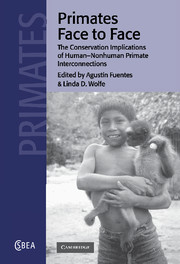Book contents
- Frontmatter
- Contents
- List of contributors
- Foreword
- Acknowledgements
- Introduction
- Part 1 Science and nonhuman primates
- 1 Anthropology and primatology
- 2 Resistance to the cross-species perspective in anthropology
- 3 The ethics and efficacy of biomedical research in chimpanzees with special regard to HIV research
- Part 2 Cultural views of nonhuman primates
- Part 3 Conservation of nonhuman primates
- Part 4 Government actions, local economies and nonhuman primates
- Index
1 - Anthropology and primatology
Published online by Cambridge University Press: 20 October 2009
- Frontmatter
- Contents
- List of contributors
- Foreword
- Acknowledgements
- Introduction
- Part 1 Science and nonhuman primates
- 1 Anthropology and primatology
- 2 Resistance to the cross-species perspective in anthropology
- 3 The ethics and efficacy of biomedical research in chimpanzees with special regard to HIV research
- Part 2 Cultural views of nonhuman primates
- Part 3 Conservation of nonhuman primates
- Part 4 Government actions, local economies and nonhuman primates
- Index
Summary
Introduction
The relationship between cultural anthropology and primatology is more important today than ever in the past. It is critical. We are at a choice point in time and the future of many if not most of the living nonhuman primates hangs in the balance. The health, safety, and very survival of threatened, and soon to be threatened, species depend on our actions. If we do not act soon it will be too late to learn from them or to save what remains of natural nonhuman primate populations. Cultural anthropology's focus on the study of different cultures places it in a unique position to offer practical advice as to how best to effect strategies of conservation that will allow both humans and nonhuman primates to share the same land. It will be virtually impossible to assure the healthy survival of many populations of nonhuman primates without the understanding and cooperation of the people who live alongside them. It is obvious that there must be an interactive association between anthropology and primatology if we are to sustain the nonhuman primates. This cooperation requires an accurate and complete understanding both of the requirements of the nonhuman primates and of the human cultures that threaten the damage.
- Type
- Chapter
- Information
- Primates Face to FaceThe Conservation Implications of Human-nonhuman Primate Interconnections, pp. 7 - 24Publisher: Cambridge University PressPrint publication year: 2002
- 6
- Cited by

